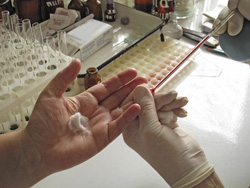Direct-to-consumer genetic testing effects on healthcare
The ‘Ethical, legal, and social aspects and implications of direct-to-consumer genetic testing’ (ELSAIDTCGT) project took an in-depth look at the implications of an increase in the offer of DTC services and the companies promoting them as products for the general public. Project members aimed to highlight various aspects of the companies involved in DTC genetic testing, gather information on the relevant views and experiences of clinical geneticists, discuss and present case studies and disseminate results to stimulate future collaborative research addressing the commercialisation of such services. Efforts and activities revealed there to be a diverse range genetic tests offered by various companies situated for the most part in the United States. This has varying implications with regards to social, ethical and legal issues. Research found that some DTC companies allow testing of children for adult onset diseases, which clashes with professional guidelines of predictive genetic testing for asymptomatic minors. Importantly, it was shown that the use of consumer data by companies selling DTC genome-wide testing for means of research blurs the lines between medical services and consumer products in particular, and between the two activities and research in general. Researchers contend that this poses a problem regarding the appropriate treatment and autonomy of individuals buying DTC genetic-testing services. Another issue that came to the fore was what do with samples and data in the event that a population biobank or DTC company closes for whatever reasons. A survey of clinical geneticists in Europe showed that over 80 % of clinicians are aware of DTC genetic-testing services on offer, with about half having seen at least one patient who had bought such a test. The majority of clinicians reported their disagreement with such activity in the absence of face-to-face medical supervision outside of the traditional healthcare system. The majority of those surveyed were also agreed to varying degrees that genome-wide testing as well as prenatal gender testing should be banned. The EU-funded study brings to the fore pertinent questions as advances in medical testing proceed rapidly. Setting the groundwork for future investigation, project results highlight the need to protect consumers as well as the medical profession.







